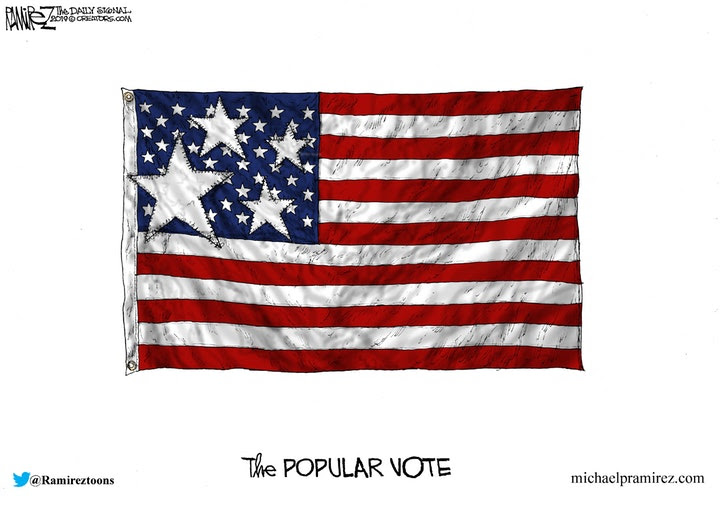The Uniquely Dangerous Movement to End the Electoral College
The National Popular Vote Interstate Compact is an existential threat to our republic — and its supporters are getting closer to success.
By JIM INHOFE & TRENT ENGLAND – December 13, 2021
Over the years we have witnessed a reliable pattern develop in American politics: When the Left loses, instead of changing its arguments or its candidates it opts to change the rules. When Democrats lost the White House and President Trump filled three vacancies on the Supreme Court, they called for packing the Court. When they failed to win a large enough majority to advance their radical agenda in the Senate, they called for abolishing the filibuster. And perhaps most insidiously, after losing presidential elections, they have set their sights on scrapping the Electoral College.
In 2006, frustrated Al Gore supporters, still fuming from his close loss to George W. Bush six years prior, launched the National Popular Vote Interstate Compact (NPVIC), a voluntary agreement among states to award their electoral votes to the winner of the national popular vote. The NPVIC is designed to go into effect once its signatory states comprise an absolute majority of all electoral votes (EV) — 270 EV, under the current map. Ten left-leaning states initially signed on, including California, Illinois, and New York, and five more blue states joined them after 2016. The plan is now nearly three-quarters of the way to taking effect, and in Michigan its supporters are currently gathering the signatures needed to put it on the ballot next year. While it suffered a major setback with Republican Glenn Youngkin’s win in the Virginia governor’s race, the NPVIC is coming closer and closer to fruition, making our efforts to oppose it more vital than ever.
NPVIC supporters’ aim is to eliminate the Electoral College without doing the hard work of amending the Constitution. The Compact requires states to choose presidential electors based not on their state popular vote, but on the national popular vote. This sounds simple, but the devil is in the details. Each NPVIC-signatory state would determine the national popular vote on its own. That means a single official in each state would decide what votes to count from every other state. In a world of perfect peace and harmony, that might work. But American politics is not a world of perfect peace and harmony.
What’s more, even if it were — even if the potential for partisan abuse were never realized — the NPVIC would still dramatically increase the power of big cities at the expense of the rest of America. Without the Electoral College, our national elections would become a coastal affair. Just nine states — including the liberal bastions of New York, Illinois, and California — make up more than 50 percent of our population. The NPVIC would strip away the voices of Oklahomans, North Dakotans, Alaskans, Arizonans, and many others. Some Democrats see this as a feature of the plan, not a bug.
- Republicans in Congress Should Update the Electoral Count Act Before It’s Too Late
- In Defense of the Electoral College
The Constitution reserves nearly all the power over elections to the states. It requires state legislatures to determine how best to represent their state in the Electoral College. It bars federal officials from serving as presidential electors. The Electoral Counts Act of 1887 reiterates this constitutional design by limiting federal power to interfere in states’ electoral-vote counting — no matter how good the intentions or real the concerns of members of Congress.
The United States is hardly alone in using a two-step democratic process to choose our national executive. Parliamentary systems work that way, and Germany and India have their own unique electoral-college systems. Requiring concurrent victories across multiple states or districts forces presidential candidates to appeal to the broadest possible cross-section of the electorate, which in turn ensures a government that reflects the diversity of its constituents.
Our great American Founders knew what they were doing in constructing a system of government that delicately balances power between cities and rural communities, between coastal communities and inland regions. The Electoral College is a critical part of that system, a guarantee that while political candidates may treat states such as Oklahoma as flyover country, Oklahomans will have as clear and powerful a voice in electing presidents as San Franciscans and New Yorkers. The very future of our republic depends on its preservation.
— Jim Inhofe is the senior United States senator from Oklahoma. Trent England is the executive director of Save Our States.

